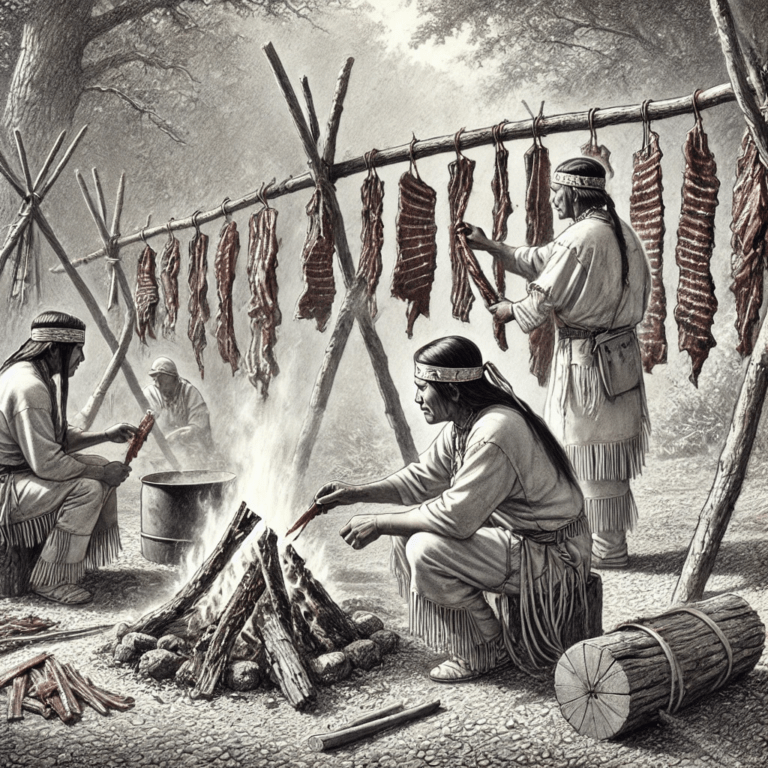CLICK ON PRODUCTS FOR DESCRIPTION AND REVIEWS
*** Sales Tax Included at checkout for the following states as listed: AL 4%, AR 1.5, CT 6.35%, HI 4%, ID 6%, ME 5.5%, MS 7%, SD 4.5%, TN 4%, UT 3%.
A BRIEF HISTORY OF JERKY
Jerky has a long and storied history, originating as a practical method for preserving meat. The term “jerky” comes from the Quechua word “ch’arki,” pronounced just like it’s spelled, and meaning dried or salted meat, and the practice predates written history.
Pre-Columbian Origins
Indigenous peoples in the Americas were among the first to develop jerky. Native Americans, particularly tribes such as the Lakota and Cherokee, preserved meat by slicing it thin, salting it, and drying it in the sun or over a fire. This made it lightweight, long-lasting, and ideal for survival and travel. They often combined the dried meat with fat and berries to create pemmican, a nutrient-rich food staple.
Colonial and Frontier America
When European settlers arrived, they adopted the practice of making jerky, learning from Native Americans. Beef, bison, and deer were commonly used. During the westward expansion in the 18th and 19th centuries, jerky became essential for pioneers, fur trappers, and cowboys who needed a portable, durable protein source on long journeys.

Industrialization
In the late 19th and early 20th centuries, industrialization brought changes to jerky production. The invention of mechanical dehydrators allowed for more consistent and large-scale production. However, jerky remained a niche food, primarily used by military personnel and outdoorsmen.
Modern Era
By the mid-20th century, beef jerky began transitioning into a mainstream snack in the United States. Improved packaging and preservation techniques, such as vacuum sealing, made it a popular convenience food. The 1980s and 1990s saw the rise of mass-market brands which capitalized on the snack’s portability and high protein content, but are filled with preservatives and other ingredients, making them a processed food.
Today in North Texas
Beef jerky has evolved into a global, diverse product, some with health-conscious variations catering to those who monitor what they feed their bodies and changing consumer tastes. At OC/BC, we put emphasis on “health-conscious” by removing the nitrates and preservatives which makes our jerky enjoyable to the masses. There is a drawback on shelf life to a maximum of six months (which we reduce even further to 60 days) but once you bite into a bag of ours, it never lasts. Flavors range from our traditional smoked BBQ infused with our BBQ sauce made with real brown sugar and molasses, to gourmet options like Teriyaki made with pure Vermont maple syrup. No high fructose corn syrup here – thank you very much. And then there is our legendary Habanero.
Ch’arki’s connection to American history, from Native traditions to cowboy culture, has solidified its place as an iconic snack in the U.S., and we believe our process of vacuum infusing our marinades into market fresh, 100%, grass-fed Texas beef eye-of-round creates the best beef jerky on the planet.
Try a bag of your favorite flavor today or get yourself a sample pack and try them all. We think you’ll agree that our jerky is THE jerky of the 21st century.
General Inquiries
$1.00 of every of bag of jerky fries sold is donated to PTSDUSA.ORG monthly to help combat veterans suffering from the effects of Post Traumatic Stress Disorder re-build their lives at Camp Hope in Houston, Texas.
Combat Trauma Help Line – 877-717-PTSD (7873)
© 2025 • Oak Cliff BBQ Company • All rights reserved.
Serving Nationwide







